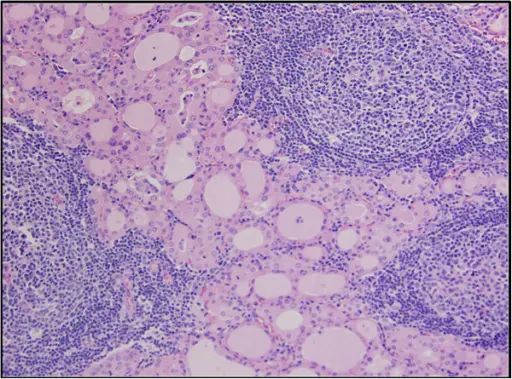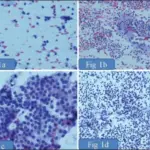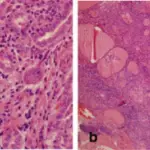Hashimoto thyroiditis is an autoimmune disease with goiter, elevated circulating antithyroid peroxidase, and antithyroglobulin antibodies in which the body immune system attacks the thyroid gland. Hashimotos thyroiditis is also known as struma lymphomatosis, lymphocytic thyroiditis.
What is the Pathology of Hashimoto Thyroiditis?
The pathology of Hashimoto thyroiditis is:
-Etiology: The cause of Hashimoto thyroiditis is heredity, excessive iodine, radiation exposure.
-Genes involved: None.
-Pathogenesis: The sequence of events that lead to Hashimoto thyroiditis involves the formation of antithyroid antibodies that attack the thyroid tissue, resulting in progressive fibrosis.
-Histology: The histology associated with Hashimoto thyroiditis shows extensive lymphocytic infiltrate with germinal center formation.
How does Hashimoto Thyroiditis Present?
Patients with Hashimoto thyroiditis are typically middle aged women. The symptoms, features, and clinical findings associated with Hashimoto thyroiditis include voice hoarseness and pressure symptoms in the neck from thyroid enlargement, slowed movement and loss of energy.
How is Hashimoto Thyroiditis Diagnosed?
Hashimoto thyroiditis is diagnosed by detecting elevated levels of antithyroid peroxidase antibodies in the serum.
How is Hashimoto Thyroiditis Treated?
Hashimoto thyroiditis is treated with thyroid hormone replacement such as levothyroxine.
What is the Prognosis of Hashimoto Thyroiditis?
The prognosis of Hashimoto thyroiditis is good with early treatment as it can reverse the symptoms immediately.



